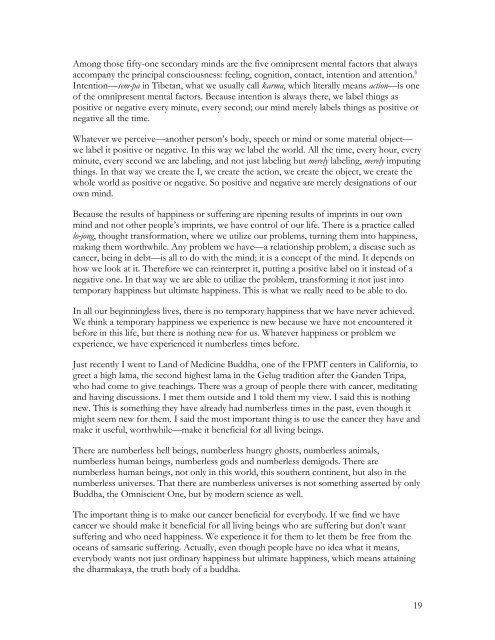Lama Zopa Rinpoche
55OTzl52A
55OTzl52A
You also want an ePaper? Increase the reach of your titles
YUMPU automatically turns print PDFs into web optimized ePapers that Google loves.
Among those fifty-one secondary minds are the five omnipresent mental factors that always<br />
accompany the principal consciousness: feeling, cognition, contact, intention and attention. 6<br />
Intention—sem-pa in Tibetan, what we usually call karma, which literally means action—is one<br />
of the omnipresent mental factors. Because intention is always there, we label things as<br />
positive or negative every minute, every second; our mind merely labels things as positive or<br />
negative all the time.<br />
Whatever we perceive—another person’s body, speech or mind or some material object—<br />
we label it positive or negative. In this way we label the world. All the time, every hour, every<br />
minute, every second we are labeling, and not just labeling but merely labeling, merely imputing<br />
things. In that way we create the I, we create the action, we create the object, we create the<br />
whole world as positive or negative. So positive and negative are merely designations of our<br />
own mind.<br />
Because the results of happiness or suffering are ripening results of imprints in our own<br />
mind and not other people’s imprints, we have control of our life. There is a practice called<br />
lo-jong, thought transformation, where we utilize our problems, turning them into happiness,<br />
making them worthwhile. Any problem we have—a relationship problem, a disease such as<br />
cancer, being in debt—is all to do with the mind; it is a concept of the mind. It depends on<br />
how we look at it. Therefore we can reinterpret it, putting a positive label on it instead of a<br />
negative one. In that way we are able to utilize the problem, transforming it not just into<br />
temporary happiness but ultimate happiness. This is what we really need to be able to do.<br />
In all our beginningless lives, there is no temporary happiness that we have never achieved.<br />
We think a temporary happiness we experience is new because we have not encountered it<br />
before in this life, but there is nothing new for us. Whatever happiness or problem we<br />
experience, we have experienced it numberless times before.<br />
Just recently I went to Land of Medicine Buddha, one of the FPMT centers in California, to<br />
greet a high lama, the second highest lama in the Gelug tradition after the Ganden Tripa,<br />
who had come to give teachings. There was a group of people there with cancer, meditating<br />
and having discussions. I met them outside and I told them my view. I said this is nothing<br />
new. This is something they have already had numberless times in the past, even though it<br />
might seem new for them. I said the most important thing is to use the cancer they have and<br />
make it useful, worthwhile—make it beneficial for all living beings.<br />
There are numberless hell beings, numberless hungry ghosts, numberless animals,<br />
numberless human beings, numberless gods and numberless demigods. There are<br />
numberless human beings, not only in this world, this southern continent, but also in the<br />
numberless universes. That there are numberless universes is not something asserted by only<br />
Buddha, the Omniscient One, but by modern science as well.<br />
The important thing is to make our cancer beneficial for everybody. If we find we have<br />
cancer we should make it beneficial for all living beings who are suffering but don’t want<br />
suffering and who need happiness. We experience it for them to let them be free from the<br />
oceans of samsaric suffering. Actually, even though people have no idea what it means,<br />
everybody wants not just ordinary happiness but ultimate happiness, which means attaining<br />
the dharmakaya, the truth body of a buddha.<br />
19


